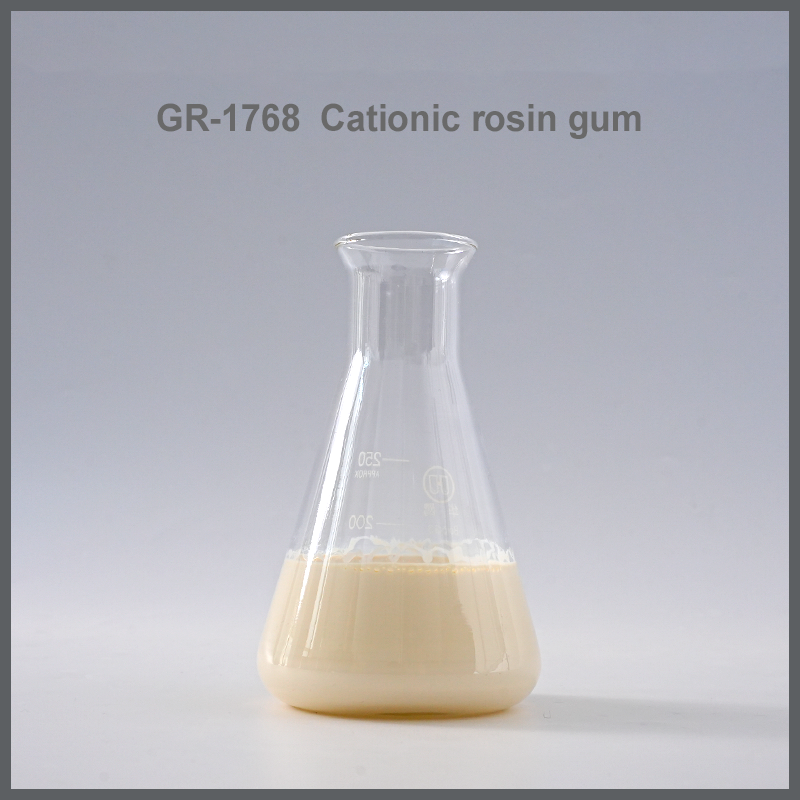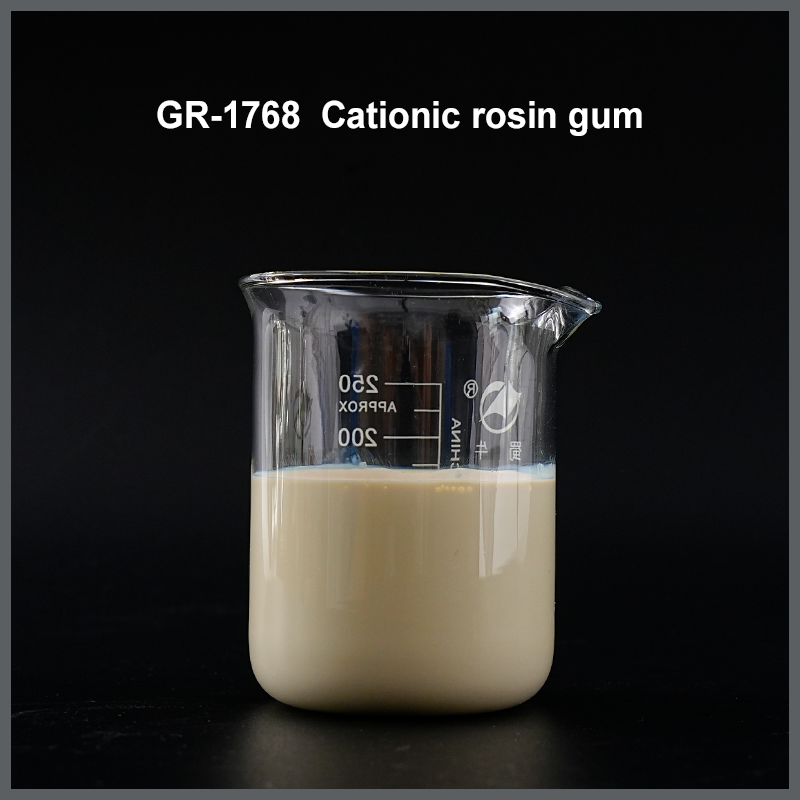products
GR-1768 Cationic rosin glue
Unlike traditional anionic rosin sizes, GR-1768's positive charge allows it to efficiently adhere to negatively charged fiber and filler surfaces through electrostatic adsorption, resulting in extremely high single-pass retention. This means excellent sizing results can be achieved even at relatively low sizing dosages, significantly improving the product's cost-effectiveness. Furthermore, because its reaction mechanism occurs during the paper drying phase with aluminum ions, it significantly reduces its reliance on aluminum sulfate (alumina), requiring only a small addition, effectively lowering costs and reducing system acidity.

◼PRODUCT DESCRIPTION
Cationic dispersed rosin glue is a positively charged white emulsion containing 100% free rosin. It has medium charge density, good water solubility, mechanical stability, and is cost-effective. The product's positive charge ensures high fiber retention with low sizing usage. It requires less aluminum sulfate as it only reacts with aluminum ions during paper drying. Unlike anionic rosin glue, it prevents scaling from calcium and magnesium ions in the system.
◼Core Advantages
High Retention: Cationic properties ensure high retention and excellent sizing at low dosages.
Cost Reduction and Efficiency Improvement: Significantly reduces aluminum sulfate (alumina) usage, reducing chemical costs and system corrosion.
Anti-Scale: A unique mechanism effectively prevents reactions with calcium and magnesium ions, reducing system deposits and keeping paper machines clean.
Stable Production: Excellent mechanical stability and water solubility make it suitable for high-speed paper machines and easy to operate.
Paper Quality Improvement: Helps improve paper smoothness and reduce holes, enhancing the quality of the finished product.



This product should be stored indoors at 5-35°C, away from direct sunlight and freezing. The recommended storage period is 6 months. If slight stratification occurs, stir thoroughly without affecting the effect.

◼The following are the main application areas of rosin glue
Main application: paper industry (sizing agent)
This is the core and largest application area for rosin sizing.
Its primary purpose is to impart water-, ink-, and corrosion-resistant properties to paper through the sizing process.
Cultural paper: Such as printing paper, writing paper, copy paper, and newsprint. Sizing prevents excessive diffusion and penetration of ink, ensuring legible handwriting and high-quality printing.
Packaging paper: Such as cartons, boxes, and tote bags. Sizing improves the paperboard's resistance to environmental moisture, maintaining its strength and stiffness, and preventing deformation due to moisture.
Specialty paper: Such as kraft paper, striped kraft paper, and interlining paper. These papers require high strength and water resistance, making rosin sizing a key process step.
Other Applications
In addition to being used as a paper sizing agent, rosin and its derivatives are also used in:
Ink Industry: Rosin resin is an important binder in the manufacture of printing inks (such as offset inks and gravure inks), providing excellent adhesion, quick drying, and gloss.
Adhesive Industry: Rosin resin and its esters are used in the production of pressure-sensitive adhesives, hot-melt adhesives, and sealants, increasing viscosity, bond strength, and flexibility.
Coatings Industry: As a film former or modifier, it is used in the production of some varnishes, paints, and road marking paints to improve the hardness, gloss, and water resistance of the paint film.
Electronics Industry: High-purity rosin resin is a core component of solder paste and flux, removing oxides from metal surfaces and preventing secondary oxidation.
Rubber Industry: As a tackifier and softener, it improves the processing properties and viscosity of rubber.
Food Industry: Rosin glycerol esters and other products can be used in chewing gum bases, food coatings, and other applications (must meet food-grade standards).






Request a Quote
Related Recommendations






